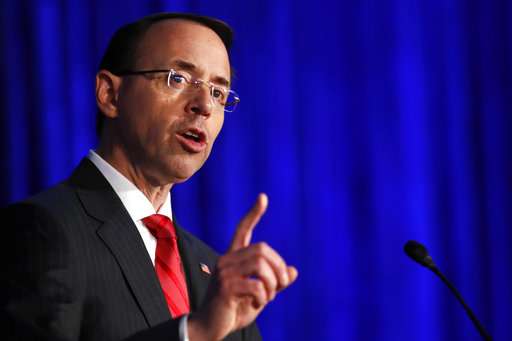Justice Dept. tries to shore up forensic science, testimony

The Justice Department is trying to shore up faltering confidence in forensic science and how its experts describe their findings in court, a push that comes months after similar efforts dating to the Obama administration were suspended.
The department said Monday it is reviving work on federal standards for forensic expert testimony, an effort initiated following revelations in 2015 that FBI experts had overstated the strength of evidence involving microscopic hair analysis in hundreds of cases dating back decades.
Longstanding concerns remain about the reliability of certain forensics evidence in criminal cases across the country, as research increasingly shows that techniques such as comparisons of hair found at crime scenes, handwriting analyses, bite-mark evidence and certain ballistics tests are scientifically flawed.
Deputy Attorney General Rod Rosenstein said he is forming a "forensic science working group" whose top missions will be setting uniform standards for how experts testify about such evidence and creating a program to monitor the accuracy of forensic testimony. It will also conduct a broad look at the personnel and equipment needs of the nation's overburdened crime labs, among other aims. He made the announcement during a private gathering of forensics professionals in Atlanta.
"We must use forensic analysis carefully, but we must continue to use it," he said, according to prepared remarks. "We should not exclude reliable forensic analysis—or any reliable expert testimony—simply because it is based on human judgment."
The working group takes the place of an Obama-era commission of independent scientists that aimed to improve the reliability of forensic science and advise the attorney general on the use of scientific evidence in the criminal justice process.
Attorney General Jeff Sessions allowed the National Commission on Forensic Science to expire in April, raising concerns among defense attorneys and other advocates about the future of the Justice Department's work in that arena. They believed the commission and its array of voices offered a better chance for an independent look at questionable techniques that have long been used in American courtrooms than would an internal Justice Department committee.
Peter Neufeld, a former member of the national commission and a co-founder of the Innocence Project, praised the effort to set guidelines for forensic testimony but said keeping the working group within the Justice Department is misguided.
"What is most unfortunate is that they want to make the entire effort to improve forensic science an in-house working group, as opposed to an independent, transparent and science-driven, proactive entity," he said. "It misses the point that forensic science is not simply about public safety, it's about achieving justice."
Rosenstein said the working group would consider the more than 250 comments and suggestions the department received in response to the commission's disbanding.
The new group will be led by Ted Hunt, a longtime prosecutor from Missouri whose online biography says he has worked on more than 100 felony trials, most of which have involved DNA or other forensic evidence. He was also involved with the commission.
A 2015 Justice Department review of lab examiners' testimony found errors relating to hair analysis in at least 90 percent of trial transcripts and covered a period before 2000. The FBI says it has improved its practices since the late 1990s. But following the discovery of flawed forensics, the department last year issued draft standards for examining and reporting forensic evidence in court.
The draft guidance covered seven forensic science disciplines, including drug and chemical analysis, body fluid testing, latent fingerprints and toxicology. And it was slated to apply to employees at the FBI, the Drug Enforcement Administration and the Bureau of Alcohol, Tobacco, Firearms and Explosives.
Officials received public comment on the drafts, but the new administration halted work on them so Rosenstein could weigh in on the best course of action. A wider review that sought to determine whether other scientific disciplines have been tainted by flawed testimony was also suspended ahead of the new administration. It was not immediately clear whether that will resume.
© 2017 The Associated Press. All rights reserved.



















